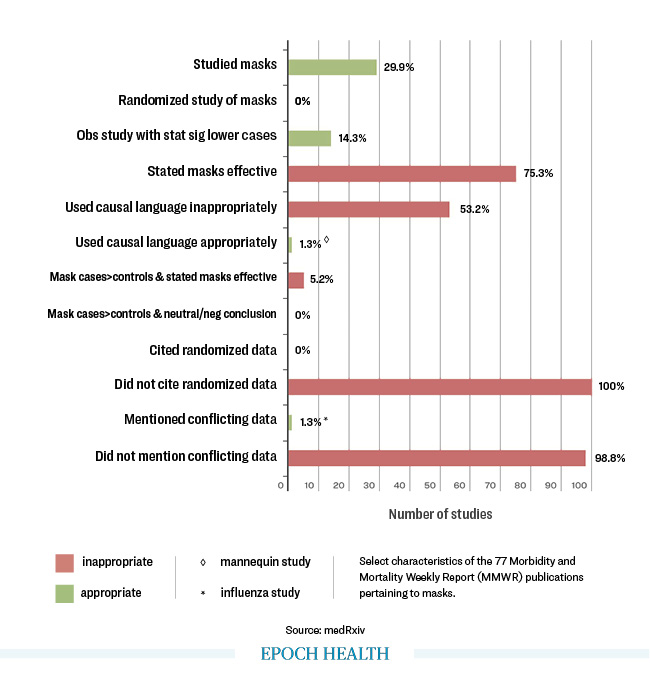CDC Used Journal to Promote Face Masks Despite ‘Unreliable’ and ‘Unsupported Data’: Analysis
A analysis of studies in the Centers for Disease Control and Prevention’s (CDC) flagship scientific journal found the agency promoted the effectiveness of face masks using unreliable data with conclusions unsupported by evidence.
The preprint, published July 11, 2023 on MedRxiv, found the CDC’s Morbidity and Mortality Weekly Report (MMWR) made positive findings about the efficacy of face masks 75 percent of the time, despite only 30 percent of studies testing masks, and less than 15 percent having “statistically significant results.”
No studies were randomized, yet the CDC in over half of their MMWR studies, made misleading statements indicating a causal relationship between mask-wearing and a decrease in COVID-19 cases or transmission, despite failing to show evidence of mask effectiveness.
The inappropriate use of causal language in MMWR studies was directly adopted by then CDC director Dr. Rochelle Walensky to promote face masks and recommendations urging Americans to mask up. The authors said their findings “raise concern about the reliability of the journal for informing health policy” and suggest bias within the journal.
The MMWR, often called “the voice of the CDC,” is the agency’s primary vehicle for “scientific publication of timely, reliable, authoritative, accurate, objective, and useful public health information and recommendations.”
The publication—subject only to peer review internally by the agency—is frequently used to draft national health policies. For example, face mask requirements implemented during the COVID-19 pandemic for federal workers, travelers, schools, businesses, healthcare workers, and Head Start programs—“mirrored” CDC recommendations.
Of the 77 reviews cited in the agency’s MMWR used to promote face masks, researchers found the following:
- Only 23 of 77 studies assessed the effectiveness of masks, yet 58 of 77 studies claimed masks were effective.
- Of the 58 studies, 41 used “causal language,” and 40 misused causal language. Causal language is where an “action or entity is explicitly presented as influencing another” and should not be used in observational studies because these types of studies merely identify “associations” and cannot establish that the “associations identified represent cause-and-effect relationships.”
- According to the analysis, the 40 studies that used causal language indicated with certainty that masks lower transmission rates, despite the fact their results, at most, found a correlation. In addition, 25 of the 40 studies didn’t even assess the effectiveness of masks. The one remaining study used causal language related to particle filtration on mannequins with “unknown relevance for human health.”
- Of the 58 studies referenced above, only one mentioned conflicting data on mask effectiveness—the authors noted it was an international study primarily focused on influenza.
- Four of the 77 studies had more cases in the mask group than in the comparator group, yet all four studies concluded masks were effective.
None of the 77 studies assessed after 2019 were randomized, and none cited randomized data. Randomized studies are the “gold standard” for determining whether an intervention or treatment is effective. Instead, the CDC most commonly used observational studies without controls or comparison groups.

“Honestly, it’s amazing & scary how apparently effective/convincing it was for the @CDCgov to state over & over masks are “critical” & “important” in spite of a total lack of high-quality data to support it,” Dr. Tracy Høeg, epidemiologist and co-author of the study said in a tweet. It will be hard to trust the journal, which they use to inform health policy decisions, moving forward, she added.
Concerns of Bias and Flawed Data Ignored by CDC
Researchers have previously raised concerns about MMWR’s publication bias, flawed methodology, and errors with the CDC that would typically warrant retraction.
Challenging the journal is difficult because the MMWR is subject to its own “clearance process” within the agency that publishes the journal instead of the independent peer-review other scientific journals are subjected to.
Of the mask studies published in the MMWR, 91 percent had one or more authors affiliated with the CDC, with a median of 13 authors per paper, some co-authoring multiple papers. In total, there were 1,544 authors, which “speaks to the large amount of effort that went into studying and publishing about this topic in the journal,” researchers stated.
In addition, beginning in September 2020, political appointees may have “demanded the ability to review and revise scientific reports” in MMWR. The process used to analyze and publish scientific data in the MMWR, which is then promoted by the CDC, has not been made available to the public.
Researchers said that political involvement and lack of accountability by outside experts unaffiliated with the CDC could influence the journal’s ability to evaluate scientific data objectively and may explain why the agency “remains an international outlier” in continuing to recommend masks for COVID-19 in specific circumstances, including for children as young as two.
Read More: Face Mask series





.png)


Comments
Post a Comment